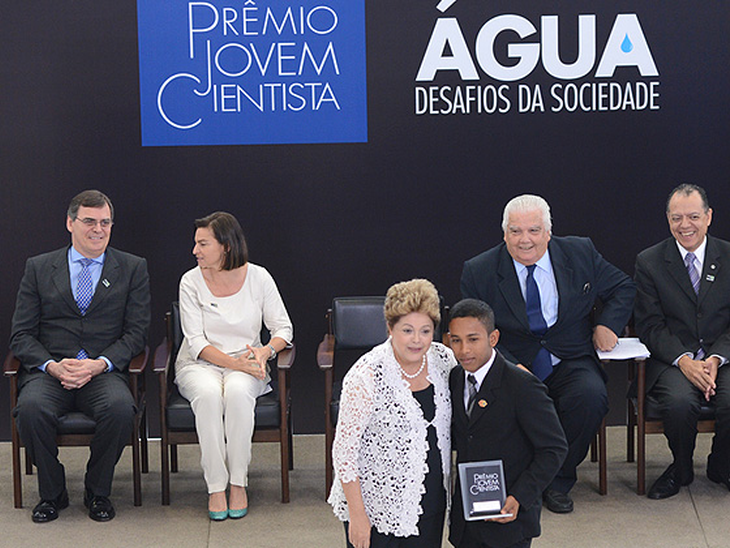
 Recognition
Recognition
This edition’s topic was Water – Challenges in Society.
Brazil Agency
The historical difficulties arising from water scarcity in Brazil’s semiarid region served as inspiration for the scientific project conducted by José Leônico de Almeida Silva, 23, an Agronomy student from the Federal Rural University of the Semiarid Region (“UFERSA”), in the state of Rio Grande do Norte. He was granted the 27th Young Scientist Award for High School in a ceremony held on Monday (Dec. 16), at the Palácio do Planalto, seat of the Brazilian Government, in Brasília. This edition’s topic was Water – Challenges in Society.
In his study, José Leônico drew a salt-water solution from the Jandaíra limestone aquifer, the main spring and one of the biggest water reservoirs in the states of Ceará and Rio Grande do Norte, and mixed it with the water used in urban supplies (available in smaller amounts) with the purpose of irrigating the soils in the country’s semiarid region. This experiment was performed in corn and sorghum fields – the Northeast’s fastest-growing crops, the choice of local farmers for the production of fodder, among other purposes.
Silva explained: “Water scarcity in the region, especially the shortage of quality water, provided me with the motivation I needed to develop this project. We found out that, by mixing salt water with the water from the supplies, applying certain proportions and using this solution for the irrigation of the crops, productivity and leaf size are reduced, but their protein content is left unaltered, which is a great result, since fodder will serve as food for animals.”
Thus, the mixture of waters is a viable choice in the growth and development of fodder-yielding plants in the Northeast’s semiarid region during the drought period (April-November). He added: “I found out the salt levels tolerated by the fodder-yielding plants. I also [found out that] the mixtures could be used not only during drought periods, but also throughout the entire year, so farmers don’t have to waste quality water on irrigation.”
During the award ceremony, president Dilma Rousseff stressed the role of the innovation fostered by young scientists, and said she will ask the Brazilian Agricultural Research Corporation (“Embrapa”) to contact José Leôncio de Almeida Silva and assess the viability of his project. “It’s been made clear at this Young Scientist Awards ceremony that a project may be brought into immediate use,” the president remarked.
Minister of Science and Technology Marco Antonio Raupp emphasized the importance of scientific knowledge and technology as key in boosting Brazil’s growth. “We all know that this is an urgent need in Brazil. We need to improve our productivity and raise our competitiveness; science, technology and innovation are indispensable tools for achieving this goal,” he said.
Gustavo Meirelles Lima, 26, who is taking his doctor’s degree in Mechanical Engineering at the Federal University of Itajubá, in the state of Minas Gerais, was also awarded during the ceremony. He has proposed a system for the microgeneration of energy in water supply networks for improving the process of collection and distribution. In his view, there’s a great energetic potential in places with high pressure within the network.
The Young Scientist Award is an initiative launched by National Council of Technological and Scientific Development (“CNPq”), aimed at spotting new talent, encouraging Brazil’s research and supporting students and young researchers who attempt to find new solutions to challenges faced by society. The prizes amount to around $300 thousand altogether. The winners had been announced in November.
Contact us